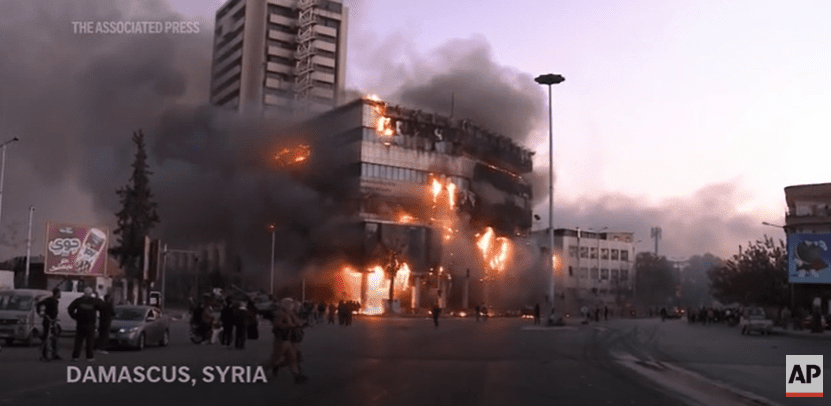|
Getting your Trinity Audio player ready...
|
Israel’s Strategic Strikes in Damascus: A Complex Power Play Amid Syrian Upheaval
Edited by: Fern Sidman
In a dramatic escalation of tensions in the Middle East, Israel conducted three targeted airstrikes in the Syrian capital of Damascus on Sunday, focusing on a key security complex and a government research center. According to a report on Reuters, these facilities had previously been identified by Israeli intelligence as hubs for Iranian missile development. The strikes coincided with the overthrow of Syrian President Bashar al-Assad’s government by Islamist-led rebels, marking one of the most significant geopolitical shifts in the region in recent years.
The strikes inflicted extensive damage on critical infrastructure in the Kafr Sousa district of Damascus. Reuters, citing two regional security sources, reported that the main customs headquarters and adjoining military intelligence offices within the security complex were severely hit. The government research center, also targeted, sustained significant destruction. One source revealed that this facility housed sensitive military data, equipment, and guided missile components, underscoring its strategic importance.
Earlier in the day, Israeli forces also struck at least seven additional targets in southwestern Syria, including the Khalkhala airbase north of Sweida city. Syrian army troops had reportedly abandoned the base the previous night, leaving behind a large cache of missiles, air defense batteries, and munitions, which were subsequently destroyed. Strikes near the Mezzah military airport, located southwest of Damascus, targeted other ammunition depots, further crippling Syria’s military capabilities.
The overthrow of Assad’s regime has left Israel grappling with a volatile mix of hope and concern. While the departure of a leader backed by Iran and Russia represents a potential strategic gain, the rapid rise of Islamist-led rebels has introduced new uncertainties, as per the Reuters report. Israeli officials fear that Syria’s stockpile of chemical weapons, prohibited munitions, and advanced missile systems could fall into the hands of these groups, significantly escalating security risks.
For years, Israel has viewed Iran’s entrenchment in Syria as a direct threat to its national security. As noted in the Reuters report, Israeli forces have conducted numerous strikes against Iranian-linked targets in Syria. However, the frequency and intensity of these operations have increased since the October 7 attack by Hamas on Israeli territory, which led to the ongoing conflict in Gaza. Sunday’s strikes represent an extension of this broader strategy to counter Iranian influence and prevent advanced weaponry from reaching hostile actors.
The airstrikes and the concurrent fall of Assad’s government signal a profound shift in the Middle East’s geopolitical landscape. Iran, a key backer of Assad during the civil war, faces the potential erosion of its influence in Syria. Meanwhile, Reuters reported that Russia’s diminished role in the region—compounded by its preoccupation with the conflict in Ukraine—further complicates the balance of power.
For Israel, the stakes could not be higher. While the removal of Assad eliminates a longtime adversary, the Islamist-led rebels now in control of Syria pose a new set of challenges. The prospect of sophisticated weaponry falling into their hands has intensified Israel’s resolve to act decisively. As the Reuters report highlighted, Israeli leaders are determined to prevent Syria from becoming a launchpad for attacks against its territory or a hub for Iranian military activities.
As Reuters reported, Israel’s actions reflect a dual objective: to neutralize immediate threats while preparing for the long-term implications of Syria’s transformation. With the Middle East at a crossroads, the international community will closely watch how these developments reshape the region’s complex web of alliances and hostilities.




